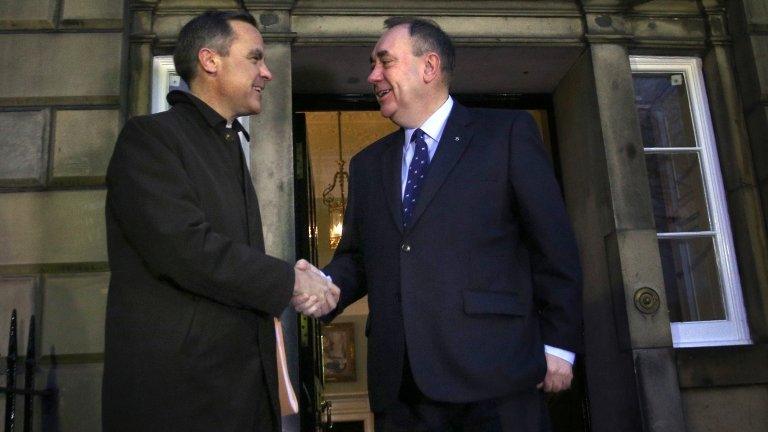Scottish independence: Sterling effort
- Published

There are many interpretations of what Mark Carney said about the currency debate
Mark Carney, the rock 'n' roll central banker, drove his roadshow into Edinburgh this past week, and although the stage act was rather dry and technical, it got him a lot of attention.
In a debate on Scotland's future which is often seen as trench warfare between inflexible, unyielding campaigns, what the governor of the Bank of England brought was something apparently shiny and new.
I've noted before how much the Bank of England behaves and is treated as a sort of high priesthood of economics. And under new management, that has had some celebrity added. So in came Mr Carney with his pronouncement on what he conceded has long been known as "the dismal science".
I wasn't there, preferring to spend my week perched on a blizzard-swept high pass between France and Italy. I've been contemplating the ease with which you can blow a lot of money around the eurozone without the costs of having to change currency.
Modern technology brought me the speech from the George Hotel on Edinburgh's George Street. And I was able to read and digest it at perhaps greater leisure than some others.
So... well, it seemed an impressive lecture in economics, notable first for what it was not. This was not an assessment of whether independence would make Scotland better or worse off. Many people would like such an assessment, of course, but don't expect one from the Bank of England governor before 18 September.
Nor was it the start of negotiation on a shared currency. It began with an acknowledgement that the arrangements for currency and for the Bank of England are political, and not for Mr Carney.
Nor was this a judgement on the relative merits of different currency options for Scotland. Indeed, he only really dealt with one such option - that of a currency alliance between an independent Scotland and the rest of the UK (RUK).
That he also acknowledged a currency deal could be done was deemed to be of great significance by one side of the debate. That side also welcomed the list of reasons why a currency alliance, in theory at least, can be A Good Thing.
If you measure the balance of the speech by length, it tilted towards the list of reasons why an alliance may involve a lot of things that don't look much like independence. He's not the first to point out that any such deal would require significant compromise on Edinburgh's autonomy, but his comments carry more weight than most.
And as people have a keen interest in the money they earn, save, invest and borrow, this rather dry technical debate really matters.
Global citizen
Bringing the perspective of a Canadian and global citizen, Mr Carney had some interesting observations on comparisons with currency alliances elsewhere.
Reflecting on the economic diversity of his home country and the US, he sees them as forms of currency alliance between provinces and states, albeit under federal governments in Ottawa and Washington.
It was, for instance, a useful contribution to the debate, to learn that an independent Scotland, with a geographic share of oil, would have as much variation from the RUK economy as the US has between its core and periphery, and moreso than the European Union.
Without that share of oil, the governor's paper highlighted the close correlation between the economies of Scotland and the rest of the UK. That includes output, on which the SNP government has been keen to stress relative under-performance over several decades, rather than correlation.
Troublespots and hotspots
To make a currency union work, Mark Carney highlighted two ways of compensating for imbalanced growth or unexpected shocks; flows of funds between regions or nations, and the movement of labour from troublespots to recruitment hot spots.
The Bank of England assessment is that the European Union has low labour mobility, perhaps much of that to do with its many languages. In 2010, as crisis deepened, it had about half the flow between Scotland and the RUK.
The mobility of the Canadian and American labour markets is vital to helping their common currencies to function. The flow of labour around the US was reckoned in 2010 to be, proportionately, four times greater than that between Scotland and the RUK.
That may be because the economies within Britain have been performing in much the same way, so there's not much incentive to move between them for work. On the other hand, that low mobility was within a highly integrated UK labour market, and with diverging employment policies, that flow could slow up.
Nova Scotia shock
On the transfer of funds within a currency alliance, the eurozone offers a contrast with the US and Canada.
Although its central government function is often criticised, what Brussels lacks has been sufficient clout to shift fiscal resources around the continent, or the power to rein in governments that break the fiscal rules.
So, it was pointed out, when Nova Scotia faces an economic shock, there are means to support it with an injection of loonies from across Canada (that's the Canadian dollar, by the way, named after the diving bird on the coin).
But when Portugal faces a shock - from a property bubble bursting, let's say - the response it gets from its eurozone partners is the reverse of an automatic stabiliser. Lisbon had to take its punishment and suffer, with spending cuts and unemployment.
In one of Mark Carney's footnotes (this speech had 10 pages of references and charts, and 27 footnotes - never can a luncheon of the Scottish Council Development and Industry have been so didactic and annotated), the governor explained that the eurozone fiscal rules were supposed to have sanctions attached. But they were never properly applied.
Perhaps that's because Germany was first to break the rules while it funded integration between its west and east. Once it had done so, why shouldn't others? Or perhaps it was because there's something obviously odd with a sanction that punishes profligacy and debt by adding fuel to the budgetary fire with a whopping big fine.
Budget oversight
Either way, the eurozone rules are now being beefed up. Instead of punishing those with big deficits, the idea is to oversee the budgets before the money is spent. And that's where national sovereignty looks compromised.
If the lessons of the eurozone crisis are applied to an alliance between Scotland and the RUK, there's an important point that often gets overlooked here. Not only would Scotland have to submit its budget to a central authority, over which Westminster might expect to have a lot of sway, but Westminster should surely be expected to do so as well. And where would that leave Westminster's much-prized and near-sacred sovereignty?
That's one of the reasons why a deal on currency would be so hard to reach. It's not enough for the RUK to want a deal or to recognise that a currency alliance is in its interests, supposing both were to be true: it's also necessary for the RUK to surrender things it holds dear.
Not only would such an alliance put the RUK on the hook for Scottish-based banks going under, but Holyrood would have to take a proportionate share of liability if Westminster's spending gets out of control, or banking regulation fails.
Now, much of the attention in this debate is being focussed on the unknowns of Scottish independence. But we know all too well that Westminster got things badly wrong in the past few years. A robust deal on currency (and that's surely the only type worth having) would have to plan ahead for either side breaking the rules, or needing bailed out. That's as well as a backstop for banks, such as RBS, which straddle the border, or for an English bank, which doesn't.
Scots currency
There are many interpretations of what Mark Carney said in his Edinburgh speech, and how it would apply to negotiations on currency after a 'yes' vote.
But among the issues he was setting out were those on which both sides would have to negotiate. The SNP government says it's clear what a newly-independent Scottish government would want (even though some nationalists would prefer a separate Scottish currency, for reasons very similar to those set out by the Bank of England governor).
But the SNP government would also have to be clear about the response it could expect. Finance Secretary John Swinney listed the advantages of having 100% control over Scotland's finances, including "tax policy, employment policy, social security policy, oil and gas revenues, immigration policy...".
Questioned subsequently, the argument put forward this week by Alex Salmond is that the currency deal need only deal with the broad spending envelope - as in the eurozone, for instance, a deficit of no more than 3% of GDP, or a debt of no more than 60%.
He told the Financial Times that the Benelux countries - Belgium, the Netherlands and Luxembourg - showed how a currency pact can work without interference in each other's tax rates.
He may well be right. But in the negotiations he wants to open after 18 September, will Westminster's negotiators see things that way?
Would Westminster, for instance, allow Scots to cut business tax to undercut the Treasury in London, or to liberalise immigration, if either could be seen as being to the disadvantage of the RUK?
Would Westminster take the Benelux precedent for a loose currency alliance, or apply the lessons from the more recent eurozone crisis? That's where the economist steps back, and the politics comes in.
The governor made clear that a deal on currency is possible. It may be workable. It may be desirable. The public in both countries may well think it sensible. But Mark Carney also made clear that it would be far from simple.
- Published29 January 2014
